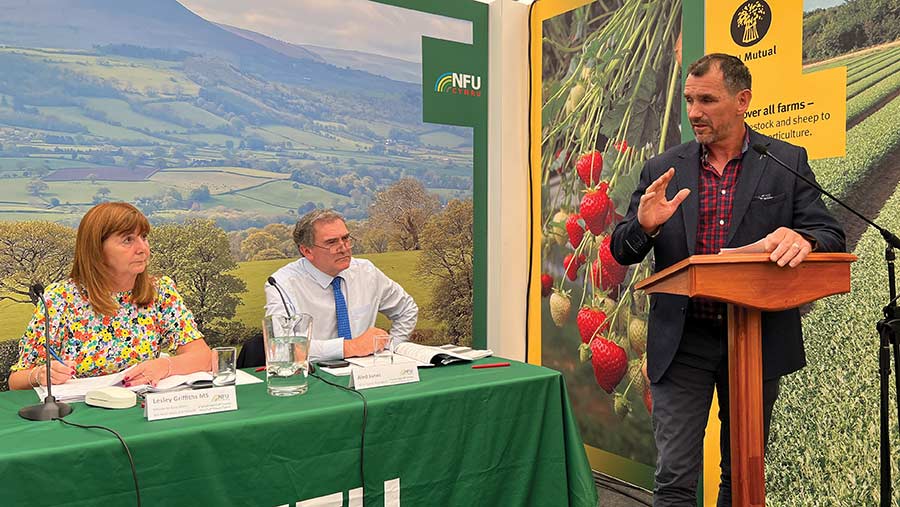Welsh farmers seek flexibility over ‘blanket’ tree planting

Lesley Griffiths, Aled Jones and Garry Williams © NFU Cymru
Farmers are demanding flexibility from the Welsh government over its plans to require all farms in Wales to plant trees on at least 10% of land to access future farm payments.
Increasing concern over “blanket” tree planting for farmers to be eligible for payments in the universal tier of the upcoming Sustainable Farming Scheme (SFS) was the major talking point among farmers attending the Royal Welsh Show this week (24-27 July).
Ahead of the show, NFU Cymru president Aled Jones and his deputy Abi Reader announced they would not be joining the scheme under its current guise as the compulsory 10% tree cover requirement would financially harm their farming businesses.
See also: NFU Cymru leaders threaten to shun Sustainable Farming Scheme
Wales’ rural affairs minister, Lesley Griffiths, said she was “extremely disappointed” by the “unexpected” announcement by the two leading figures in NFU Cymru, suggesting it had been premature.
But at a policy session hosted by the union at the showground on Tuesday (25 July), farmers urged the minister to rethink the mandatory 10% tree cover proposal.
NFU Cymru dairy board member Jeff Evans said the 10% tree cover rule and the additional plan to enhance habitats across at least 10% of farms under the SFS worried him most as a farming tenant based in Pembrokeshire.
“I can only see that land values, in particular land rents, will increase while our productivity will be compromised and this surely is not sustainable,” he said.
Upland sheep farmer Garry Williams, who farms within the Brecon Beacons, said farmers considered food production as their primary role, but he warned the minister food security “may only become an issue when it is too late”.
Mr Williams said tens of thousands of hedgerow trees had been planted on his farm under previous agri-environment schemes. But he could not understand why the Welsh government had decided against including hedgerows within the 10% tree cover requirement.
He asked the minister: “Can you really ask the farmers who are farming some of the best ground within Wales to plant 10% of trees? Will the banks allow them to do it?”
There were other sources of carbon sequestration on farms besides trees, he said.
Mr Williams also warned that “blanket” tree planting across the Welsh countryside to offset carbon risked sparking large-scale wildfires. “There goes your carbon. It’s gone up in smoke if you’re not careful.”
In response, Ms Griffiths told the audience of about 100 farmers that the SFS scheme was “still evolving”, adding that flexibility was “really important”. She urged all farmers to respond to a final consultation on the SFS at the end of the year.
But she added: “The target is 43,000ha of new woodland by 2030. That’s the target the Welsh government set on the back of the UK Climate Change Committee’s recommendations to us.
“We have not planted enough trees in Wales. We have to achieve that target. We believe you [farmers] are the people to help us reach that target.
“I do have lots of international obligations [to meet]. The whole Senedd agreed to us achieving net zero by 2050 with interim targets along the way.”
In addition to tree planting concerns, farmers were also alarmed by Welsh government plans for a new interim agri-environment scheme to be introduced in Wales next year to bridge the gap between the old Glastir scheme, closing on 31 December 2023, and the new SFS starting in 2025.
Ms Griffiths said she did not know the budget for the interim scheme. But she added: “I am confident it will all be up and running for 1 January 2024.
“It’s going to be very quick. Officials have got so many other things going on. But it is really important we have that scheme.”
